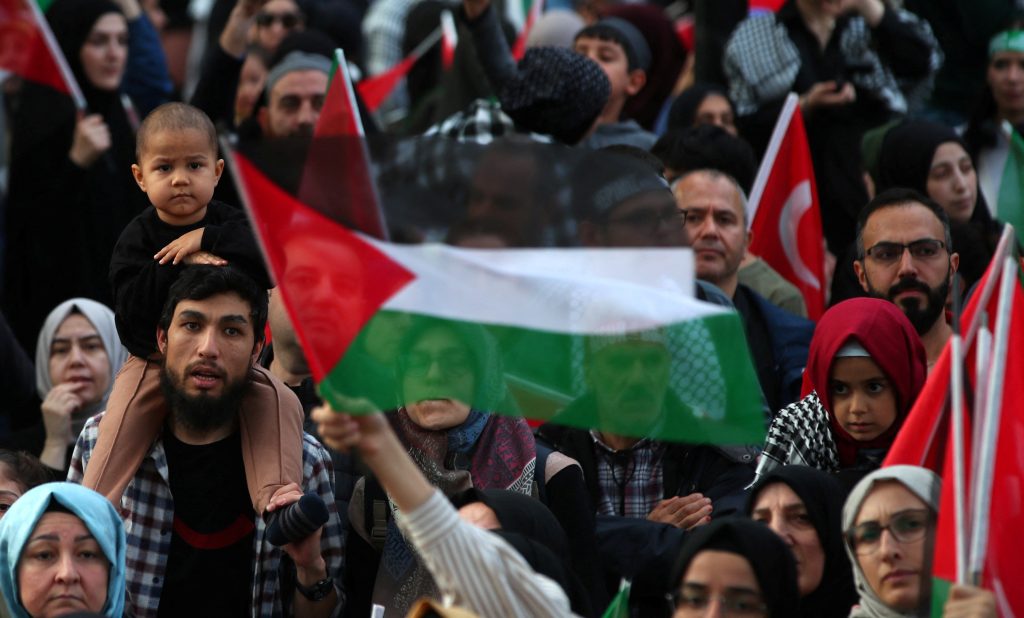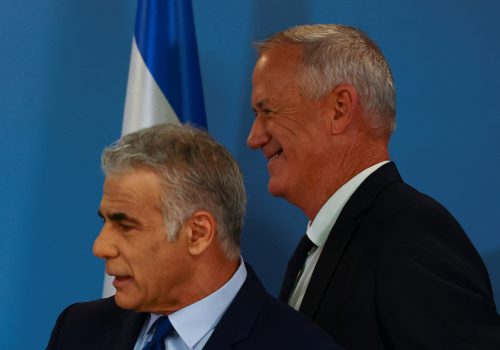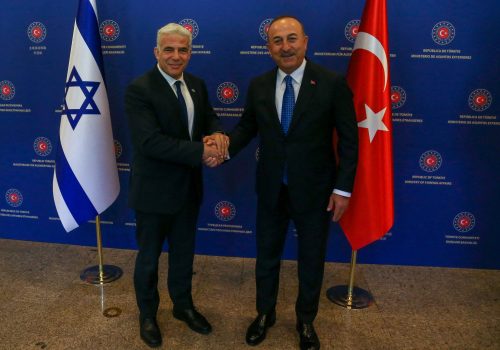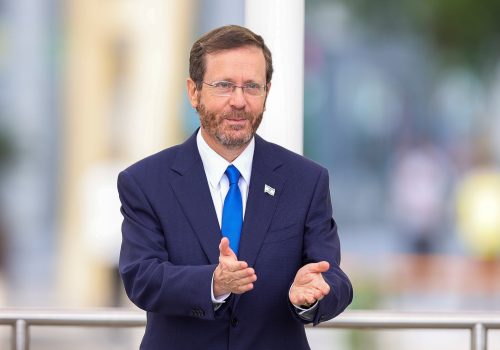In October, Turkish President Recep Tayyip Erdoğan had been facing calls to take a tougher stance on Israel’s military campaign in Gaza—and he responded with a notable shift in rhetoric. But in doing so, he also puts the interests of Turkey and its credibility as a regional power broker at risk.
Following remarks on October 25 and at the “Great Palestine Meeting” on October 28, Turkey’s citizens are wondering whether Erdoğan’s party intended to overshadow the republic’s historic centenary. Regardless, Erdoğan seems to have adopted a shift in rhetoric, perhaps to take advantage of the high emotions of the rally’s participants—using growing anger over Israel’s actions, and US support for those actions, to solidify support for him. Given this sea of enmity against Israel, Erdoğan could have concluded that it would be risky for the West to call out Ankara for his remarks (as that could further fuel anti-West sentiment), offering him an opening to give his speech and appeal to his base.
Erdoğan’s divergence from the West—shown in his remarks at the rally for Palestine—stands in stark contrast to his signing of the protocol for Sweden’s NATO accession and sending it to parliament for final approval just days before the speech. Although the Turkish parliament’s foreign affairs subcommittee has not yet voted on the matter, Erdoğan’s move with the protocol seems to have been strategically timed as an olive branch to the West. But neither the West nor Erdoğan’s opponents have any obligation to see these developments the way he wants them to be seen and acted upon.
Erdoğan’s rhetoric, specifically about Israel and the West, has evolved, contrasting sharply with the more moderate, balanced foreign policy that the president has touted since 2020. After reestablishing diplomatic ties with Israel in 2022, he began choosing his words carefully. For example, when Israel violently raided the Jenin refugee camp in July this year in its fight against terrorism, Erdoğan largely stuck to releasing statements through the Turkish Ministry of Foreign Affairs. When Hamas attacked Israel on October 7, killing around 1,200 Israelis, Erdoğan initially called for calm and made carefully written statements, even offering to mediate to end the conflict.
But Erdoğan’s choice of words began to evolve, particularly after the October 17 blast at al-Ahli Hospital—which killed hundreds of people—when the president rushed to blame Israel for the strike and called upon “all humanity” to stop the “unprecedented brutality” in Gaza (the source of the blast remains unconfirmed, but US and other allied intelligence agencies have been explicit that, according to their assessments, it was not an Israeli strike). On October 25, Erdoğan called Hamas a mujahadeen, casting it as a religious freedom fighter group rather than a terror organization. He also doubled down on his anti-West rhetoric and accused Israel of committing crimes against humanity. At the “Great Palestine Meeting,” Erdoğan said Turkey would “proclaim” Israel a “war criminal.” In response, Israeli Foreign Minister Eli Cohen ordered the return of Israel’s diplomats from Turkey “to conduct a reevaluation of the relations between Israel and Turkey.”
Despite what Erdoğan’s remarks may convey, there are far more Turkish citizens who want their government to remain neutral in the war than there are citizens who want to back Hamas, according to the Metropoll Strategic and Social Research Centre (in a poll conducted in the weeks before the al-Alhi Hospital blast). In the background of those poll results, the public continues to struggle with staggeringly high inflation and the ongoing depreciation of the lira, and the government continues to attempt to balance its priorities—ones that, at the moment, more directly impact Turkey’s economic stability and national security than the Israel-Hamas war.
But Erdoğan’s rhetoric doesn’t necessarily match his official actions, which leave the door open to Israel. While he did recall Turkish Ambassador to Israel Şakir Özkan Torunlar for consultations, a week after Israel withdrew its diplomats for consultations, he hasn’t completely downgraded relations, saying that “complete disconnection is not possible.”
Turkey has temporarily halted plans for joint energy cooperation and exploration with Israel in the Eastern Mediterranean, but Erdoğan did not unveil any other potential actions against Israel at the rally. Turkey’s trade relations with Israel have consistently remained strong despite the ups and downs in bilateral relations. Given Turkey’s economic problems, it would be hard for Erdoğan to unilaterally call off relations with Israel. Turkey’s president is in a bind of his own making, with two choices: further rally only those who back his new rhetoric—and risk alienating citizens who still prefer neutrality in this war—or tread carefully and serve his country’s interests, and in doing so, put his party in a position to make gains in the 2024 local elections.
While Erdoğan’s rhetoric has raised concern that Turkey might unilaterally send troops to Gaza, he is unlikely to do so. However, if a United Nations-approved force comes to being, Erdoğan could—and is likely to—secure a role for the Turkish military in safeguarding Palestinian civilians. Turkey has a track record for working in multinational and NATO peacekeeping and military operations such as ones in Afghanistan and Bosnia and Herzegovina.
Turkey’s credibility in the region as a power broker is also at stake: The more that Turkey turns away from the West, the more that it loses its credibility in the region. Erdoğan’s harsh rhetoric will no longer win him the points in the Arab world it would have before the Arab Spring.
Going forward, Erdoğan must undertake a difficult balancing act, as he wields the most influence—and serves his country’s political and economic interests best—from a neutral position.
Tulin Daloglu is a Turkey-based journalist. Follow her on Twitter @TulinDaloglu.
Further reading
Thu, Nov 10, 2022
With an eye on Iran, Turkish-Israeli relations will deepen
TURKEYSource By Pınar Dost
Driven by strong regional imperatives, Turkey-Israel relations are warming quickly. After a decade long rift, the two countries have many areas to benefit from cooperation.
Tue, Aug 23, 2022
Washington wins as Turkey and Israel restore normal ties
TURKEYSource By Brenda Shaffer
Turkey and Israel restoring full diplomatic ties is a boon for each country and in the interests of the United States.
Wed, Mar 9, 2022
With the Israeli president’s visit, are Israel-Turkey relations back on track?
TURKEYSource By
The Atlantic Council IN TURKEY discusses the significance of Israeli President Isaac Herzog's visit to Turkey, the first state level bilateral visit since 2008 following over a decade of tensions between the two countries.
Image: Protesters march in support of Palestinians in Gaza, amid the ongoing conflict between Israel and the Palestinian Islamist group Hamas, in Istanbul, Turkey, November 12, 2023. REUTERS/Dilara Senkaya



